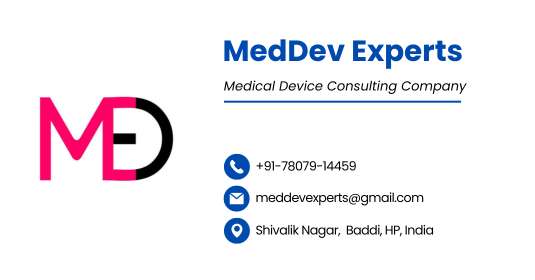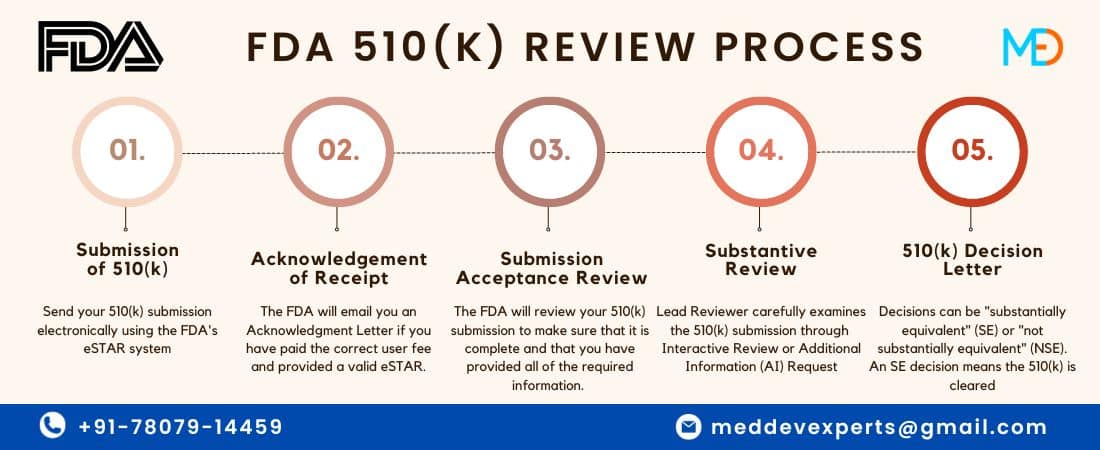US FDA 510(k) Consultant for Medical Devices in India
Leading FDA 510(k) Consultants in India. Proven Methods, Comprehensive Support to Achieve Approval.
Welcome to
What is a 510(k)?
A 510(k) is a Pre-Market Notification submitted to the US FDA to introduce a subsequent equivalent device to the US market that is as safe and effective as one that is already legally being marketed in the US.
A 510(k) submission involves showing that your device is very similar in safety and effectiveness to a device that’s already being sold legally in the US. This is called “substantial equivalence” which basically means your device is just as safe and works just as well as the one it’s compared to.
Types of 510(k) Submission
There are three types of Premarket Notification 510(k) submissions to get marketing clearance. These are Traditional, Special, and Abbreviated 510(k) submissions
1. Traditional 510(k) Submission
The Traditional FDA 510(k) is also referred to as the original 510(k) and can be used in any situation.
2. Special 510(k) Submission
The Abbreviated FDA 510(k) is used when the submission is based on FDA guidance documents, demonstrates compliance with special controls for device type, or follows a voluntary consensus standard.
3. Abbreviated 510(k) Submission
The Special FDA 510(k) is utilized when there’s a modification to a device, but the modification doesn’t impact the intended use.
Each year, the US FDA approves thousands of 510(k) applications. Thousands of 510(k) applications are rejected by the FDA or abandoned by the applicant due to a lack of proper guidance.
MedDev Experts provides proper guidance to get your FDA 510(k) application approved by the FDA.
How MedDev Experts help you to get your FDA 510(k) Application Approved?
MedDev Experts is a renowned Medical Device Consulting Company specializing in FDA 510(k) submissions, helping medical device manufacturers navigate the regulatory landscape effectively. With a team of seasoned professionals well-versed in FDA regulations and submission intricacies, MedDev Experts provides invaluable support in ensuring a smoother and more efficient approval process.

Our approach to your medical device 510(k) application is as follows:
Validate your FDA product code, regulation number, and predicate devices
Incorrect product code selection can lead to FDA 510(k) application rejection. Equally crucial is the careful identification of appropriate predicate devices for comparison with your device.
Thoroughly identify all testing needs, FDA guidance references, consensus standards, and clinical data requirements.
Each product code is linked to FDA guidance documents and consensus standards. We diligently research these references, ensuring compliance with testing and clinical data requisites. We guide your team on the necessary testing and potential collection of clinical data, as applicable.
Develop an in-depth gap analysis
Armed with an understanding of the requirements and a comprehensive evaluation of your existing documentation, we produce a detailed gap analysis report. This report illustrates the information currently available and the data needed for a seamless 510(k) submission.
Assemble and submit the FDA 510(k) application
Once all necessary data and testing components are gathered, our FDA consultant compiles all 20 sections of your 510(k) application. We submit it to the FDA and address any follow-up inquiries from reviewers. While “Additional Information (AI)” requests are common, our aim is to minimize these by ensuring comprehensive sections within the 510(k) application, encompassing all mandatory data referenced in consensus standards and guidance documents.
The process of FDA 510(k) submissions is a critical phase in the journey of medical device manufacturers towards market approval. MedDev Experts specialized expertise, regulatory knowledge, and tailored guidance position it as a valuable partner for medical device companies striving to achieve FDA approval efficiently and effectively.
Submission of 510(k)
Send your 510(k) submission electronically using the FDA’s eSTAR system.
Acknowledgement of Receipt
After you submit your 510(k), the FDA will email you an Acknowledgment Letter if you have paid the correct user fee and provided a valid eSTAR. The Acknowledgment Letter will include your 510(k) number and the date that the FDA received your submission.
If you have not paid the correct user fee or provided a valid eSTAR, the FDA will email you a Hold Letter. The FDA will usually send the Acknowledgement or Hold Letter within 7 days of receiving your submission.
Submission Acceptance Review
The FDA will review your 510(k) submission to make sure that it is complete and that you have provided all of the required information. If your submission is not complete, the FDA will send you an email to let you know within 15 days.
You will then have 180 days to fix the incomplete information and submit a revised submission. If you do not submit a revised submission within 180 days, the FDA will consider your 510(k) to be withdrawn.
Once your submission has been accepted, the FDA will begin the substantive review. The substantive review is a more in-depth review of your submission to make sure that your device is safe and effective.
Substantive Review:
- Lead Reviewer carefully examines the 510(k) submission.
- Within 60 days of receiving the submission, there’s a Substantive Interaction with the submitter.
- Substantive Interaction can be an email confirming that the FDA will proceed with an Interactive Review or an Additional Information (AI) request, which puts the submission on hold.
Interactive Review:
- If the Lead Reviewer chooses Interactive Review, it means they believe any issues can be resolved within the Medical Device User Fee Amendment (MDUFA) timeframe, and the submission won’t be held up.
- The Lead Reviewer communicates with the submitter through email or phone calls.
- During this phase, the Lead Reviewer may request more information, which the submitter sends either to the Lead Reviewer or the FDA.
Additional Information (AI) Request:
- If the Lead Reviewer requests AI, the submission is paused.
- The submitter has 180 days to provide a complete response to the AI Request.
- The FDA must receive the complete response within 180 days from the AI Request date. No extensions are granted.
- If the FDA doesn’t get a complete response within this time, the submission is considered withdrawn.
- To avoid this, the submitter must send a response with specific details to the FDA. This response should include their name, 510(k) number, and date of the FDA’s request.
510(k) Decision Letter:
The FDA aims to decide on a 510(k) submission within 90 “FDA Days,” excluding any days on hold due to an AI request. Decisions can be “substantially equivalent” (SE) or “not substantially equivalent” (NSE). An SE decision means the 510(k) is cleared, with the details sent to the submitter via email. If the FDA can’t decide within 100 FDA Days, they send a “Missed MDUFA Communication” with feedback and an estimated completion date.
Starting October 1, 2023, all medical device submissions must be electronic using eSTAR. This means that all 510(k) submissions must be created and submitted electronically using the FDA’s eSTAR system. eSTAR is a web-based system that allows medical device manufacturers to submit their 510(k) submissions to the FDA electronically.
Average FDA 510(k) Clearance Timeline
The average FDA 510(k) clearance time is 90 days, excluding any days on hold due to an AI request.
Here is a breakdown of the average FDA 510(k) clearance timeline:
- Acknowledgement of Receipt: 7 days
- Submission Acceptance Review: 15 days
- Substantive Review: 60 days
- 510(k) Decision: 90 days
- Missed MDUFA Communication: 100 days
If the FDA cannot make a decision on a 510(k) submission within 100 FDA Days, they will send a “Missed MDUFA Communication” to the submitter with feedback and an estimated completion date. It is important to note that the FDA 510(k) clearance time can vary depending on the complexity of the device and the number of submissions that the FDA is currently reviewing.
- Incomplete or inaccurate information: Make sure all required information in your submission is complete and accurate. Missing or incorrect data can cause delays and rejections.
- Inadequate device description: Clearly describe your medical device and its intended use. Lack of clarity can lead to misunderstandings and delays.
- Failure to address risk: Identify and address potential risks associated with your device. Failing to do so can result in rejection.
- Lack of predicate comparison: Provide a thorough comparison to a legally marketed predicate device to demonstrate substantial equivalence.
- Insufficient testing and data: Ensure you’ve conducted appropriate testing and gathered sufficient data to support your claims.
- Inadequate labeling and instructions: Proper labeling and clear instructions for use are crucial. Inadequate information can lead to usability issues.
- Failure to comply with regulatory changes: Keep up to date with FDA regulations and guidelines, as non-compliance can result in submission issues.
- Late response to FDA requests: Timely response to FDA inquiries is essential. Delays in communication can prolong the review process.
- Ignoring the pre-submission process: Consider engaging in the FDA’s pre-submission process to address potential concerns before formal submission.
- Non-compliance with eSTAR requirements: Ensure your electronic submissions meet the FDA’s requirements.




